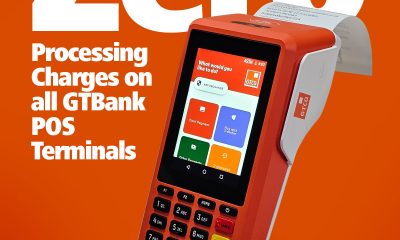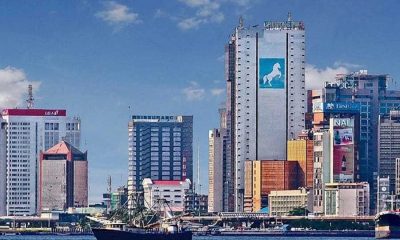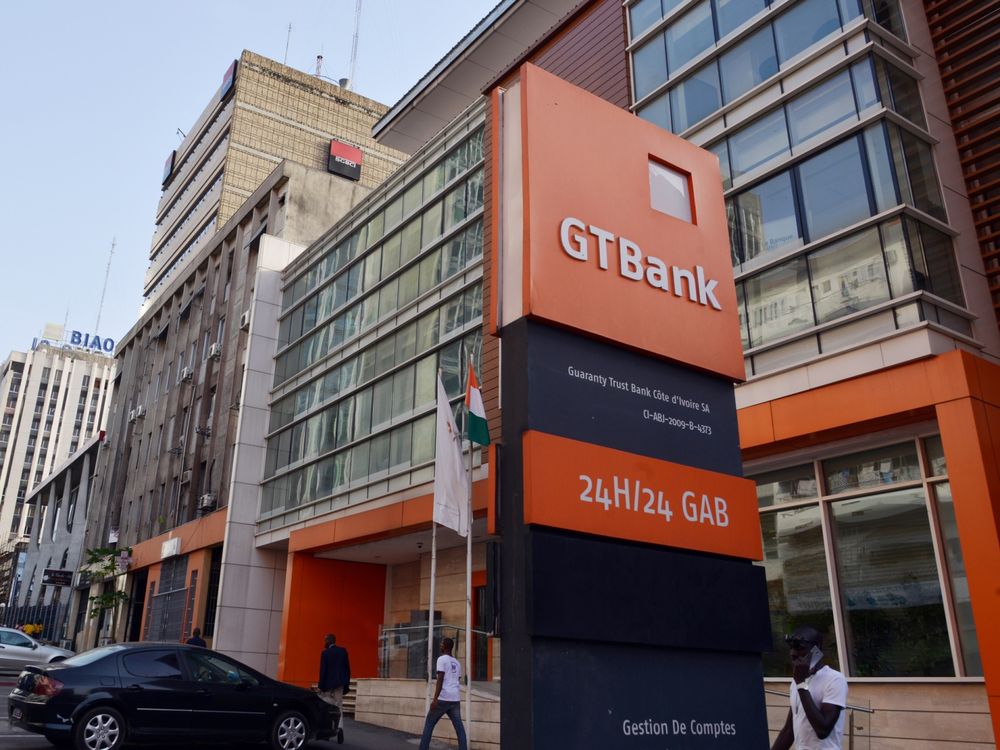Economy
Despite Challenges, GTBank Optimistic of Strong, Sustainable Returns

By Dipo Olowookere
The management of Guaranty Trust Bank (GTBank) Plc has expressed optimism that the company will deliver strong and sustainable returns to shareholders in the midst of the macroeconomic uncertainties that persist in the business environment.
This assurance was given by the Managing Director/CEO of GTBank, Mr Segun Agbaje, while reacting to the financial results of the firm released last week.
Many businesses across the world are gradually getting back on the feet as a result of the devastating effect of the coronavirus disease last year.
In Nigeria, there was an economic recession in the third quarter of 2020 influenced by the pandemic but luckily for the country, it exited in the fourth quarter of the year.
However, the effect of the economic crisis is still being felt and in the first quarter of this year, GTBank did not have good as its profit before tax went down by 7.8 per cent to N53.7 billion from N58.2 billion recorded in the corresponding period of March 2020.
Its deposit liabilities increased by 3.0 per cent from N3.611 trillion in December 2020 to N3.717 trillion in March 2021, whilst the net loan book reduced by 1.4 per cent from N1.663 trillion in December 2020 to N1.639 trillion in March 2021.
However, the balance sheet of GTBank remained well structured and diversified with total assets and shareholders’ funds closing at N4.993 trillion and N837.2 billion respectively.
The full impact Capital Adequacy Ratio (CAR) remained very strong, closing at 26.1 per cent, while asset quality was sustained as NPL ratio and Cost of Risk (COR) closed at 6.1 per cent and 0.11 per cent in March 2021 from 6.0 per cent and 0.08 per cent in March 2020 respectively.
It is important to note that GTBank continues to post one of the best metrics in the Nigerian banking industry in terms of all financial ratios as the Return on Equity (ROAE) stood at 26.0 per cent, Return on Assets (ROAA) at 4.3 per cent and cost to income ratio at 42.6 per cent.
“We have started off the 2021 financial year on a fair footing and our first-quarter results demonstrate our ability to continue delivering strong and sustainable returns, despite the macroeconomic uncertainties that persist in our business environment.
“This is a reflection of the resilience of our franchise, our prudent approach to risk management and the efficacy of our digital-first customer-centric business strategy,” Mr Agbaje stated.
“Looking forward, we are optimistic about the long-term value that we will continue to create as an organization.
“We strongly believe that our new growth strategy, together with the enduring loyalty of our customers, the hard work and dedication of our staff and the unwavering support we continue to enjoy from our shareholders, will enable us drive and deliver best-in-class financial solutions for people, businesses and communities across Africa and beyond,” the banker further said.
GTBank, renowned for its forward-thinking approach to financial services and customer engagement, was recently ranked Africa’s Most Admired Finance Brand in the 10th-anniversary rankings of Brand Africa 100: Africa’s Best Brands, the pre-eminent survey and ranking of the Top 100 admired brands in Africa.
The lender was also awarded the Best Bank in Nigeria by Euromoney Magazine for a record-extending tenth time and the Euromoney Excellence in Leadership Africa Award for its swift reaction in responding to the COVID-19 crisis and for addressing the impact of the pandemic on its customers and communities.
Economy
LIRS Urges Taxpayers to File Annual Returns Ahead of Deadline

By Modupe Gbadeyanka
All individual taxpayers in Lagos State have been advised to file their annual tax returns ahead of the March 31 deadline.
This appeal was made by the Lagos State Internal Revenue Service (LIRS) in a statement issued by its Head of Corporate Communications, Mrs Monsurat Amasa-Oyelude.
The notice quoted the chairman of LIRS, Mr Ayodele Subair, as saying that timely filing remains both a constitutional and statutory obligation as well as a civic responsibility.
The statutory filing requirement applies to all taxable persons, including self-employed individuals, business owners, professionals, persons in the informal sector, and employees under the Pay-As-You-Earn (PAYE) scheme.
In accordance with Section 24(f) of the 1999 Constitution of the Federal Republic of Nigeria, Sections 13 &14(3) of the Nigeria Tax Administration Act 2025 (NTAA), every individual with taxable income is required to submit a true and correct return of total income from all sources for the preceding year (January 1 to December 31, 2025) within 90 days of the commencement of a new assessment year.
“Filing of annual tax returns is not optional. It is a legal requirement under the Nigeria Tax Administration Act 2025. We encourage all Lagos residents earning taxable income to file early and accurately.
“Early and accurate filing not only ensures full adherence with statutory requirements, but supports effective monitoring and forecasting, which are critical to Lagos State’s fiscal planning and long-term sustainability,” Mr Subair stated.
He further noted that failure to file returns by the statutory deadline attracts administrative penalties, interest, and other enforcement measures as prescribed by law.
To enhance convenience and efficiency, all individual tax returns must be submitted electronically via the LIRS eTax portal at https://etax.lirs.net. The platform enables taxpayers to register, file returns, upload supporting documents, and manage their tax profiles securely from anywhere.
In keeping with global best practices, Mr Subair reiterated that LIRS continues to prioritise digital tax administration and taxpayer support services. He affirmed that the LIRS eTax platform is secure and accessible worldwide. Taxpayers requiring assistance may visit any of the LIRS offices or other channels.
Economy
NNPC Targets 230% LPG Supply Surge to 5MTPA Under Gas Master Plan 2026

By Adedapo Adesanya
The Nigerian National Petroleum Company (NNPC) Limited has said the Gas Master Plan 2026 targets over 230 per cent scale-up of Liquefied Petroleum Gas (LPG) supply from 1.5 million tonnes per annum (MTPA) to 5 MTPA this year.
The Executive Vice President for Gas, Power and New Energy at NNPC, Mr Olalekan Ogunleye, unveiled the strategic direction of the NNPC Gas Master Plan 2026, outlining an aggressive expansion drive to position Nigeria as a regional and global gas powerhouse.
Mr Ogunleye delivered the keynote address at the 2026 Lagos Energy Week, organised by the Society of Petroleum Engineers (SPE), where he detailed plans to accelerate gas development, deepen infrastructure and significantly scale domestic supply.
According to him, the Gas Master Plan targets a scale-up of LPG or cooking gas supply from 1.5 MTPA to 5 MTPA, alongside expanded feedstock for Mini-LNG and Compressed Natural Gas (CNG) projects.
“The NNPC Gas Master Plan 2026 is a blueprint to unlock Nigeria’s vast gas potential and translate it into tangible economic value,” Mr Ogunleye said.
He added that the strategy would also drive exponential growth in Gas-Based Industries, GBIs, strengthening local manufacturing, fertiliser production and power generation.
“Our renewed focus is on turning abundant gas resources into inclusive economic growth and improved quality of life for Nigerians,” he stated.
Mr Ogunleye said the plan aligns with the Federal Government’s Decade of Gas initiative and the presidential production targets of achieving 10 billion cubic feet per day by 2027 and 12 BCF/D by 2030.
Industry leaders at the event, including executives from Chevron Corporation, Esso Exploration and Production Nigeria Limited, Midwestern Oil and Gas Company Limited, Abuja Gas Processing Company and Shell Nigeria Gas, commended the plan and praised Ogunleye’s leadership in driving implementation excellence.
The new blueprint signals NNPC’s determination to anchor Nigeria’s energy transition on gas, leveraging infrastructure expansion and domestic utilisation to consolidate the country’s status as Africa’s largest gas reserve holder.
Economy
Shettima Blames CBN’s FX Intervention for Naira Depreciation

By Adedapo Adesanya
Vice President Kashim Shettima has attributed the Naira’s recent depreciation to the intervention of the Central Bank of Nigeria (CBN) in the foreign exchange (FX) market, stating that the currency could have strengthened to around N1,000 per Dollar within weeks if the apex bank had allowed market forces to prevail.
The local currency has dropped over N8.37 on the Dollar in the last week, as it closed at N1,355.37/$1 on Tuesday at the Nigerian Autonomous Foreign Exchange Market (NAFEM), after it went on a spree late last month and into the early weeks of February.
However, speaking on Tuesday at the Progressive Governors’ Forum (PGF), Renewed Hope Ambassadors Strategic Summit in Abuja, the Nigerian VP said the intervention was to ensure stability.
“In fact, if not for the interventions by the Central Bank of Nigeria yesterday, the 1,000 Naira to a Dollar we are going to attain in weeks, not in months. But for the purpose of market stability, the CBN generously intervened yesterday.
“So, for some of my friends, especially one of our party leaders who takes delight in stockpiling dollars, it is a wake-up call,” the vice president said.
He was alluding to CBN buying US Dollars from the market to slow down the rapid rise of the Naira.
Latest information showed that last week, the apex bank bought about $189.80 million to reduce excess Dollar supply and control how fast the Naira was gaining value.
The move was aimed at preventing foreign portfolio investors from exiting Nigeria’s fixed-income market, as large-scale sell-offs could heighten demand for US Dollars, intensify capital flight, and exert further pressure on the exchange rate.
Amid this, speaking after the 304th meeting of the monetary policy committee (MPC) of the CBN on Tuesday, Governor of the central bank, Mr Yemi Cardoso, said Nigeria’s gross external reserves have risen to $50.45 billion, the highest level in 13 years.
This strengthens the country’s foreign exchange buffers, enhances the apex bank’s capacity to defend the Naira when needed, and boosts investor confidence in the stability of the Nigerian FX market.
-

 Feature/OPED6 years ago
Feature/OPED6 years agoDavos was Different this year
-
Travel/Tourism10 years ago
Lagos Seals Western Lodge Hotel In Ikorodu
-

 Showbiz3 years ago
Showbiz3 years agoEstranged Lover Releases Videos of Empress Njamah Bathing
-

 Banking8 years ago
Banking8 years agoSort Codes of GTBank Branches in Nigeria
-

 Economy3 years ago
Economy3 years agoSubsidy Removal: CNG at N130 Per Litre Cheaper Than Petrol—IPMAN
-

 Banking3 years ago
Banking3 years agoSort Codes of UBA Branches in Nigeria
-

 Banking3 years ago
Banking3 years agoFirst Bank Announces Planned Downtime
-

 Sports3 years ago
Sports3 years agoHighest Paid Nigerian Footballer – How Much Do Nigerian Footballers Earn



















